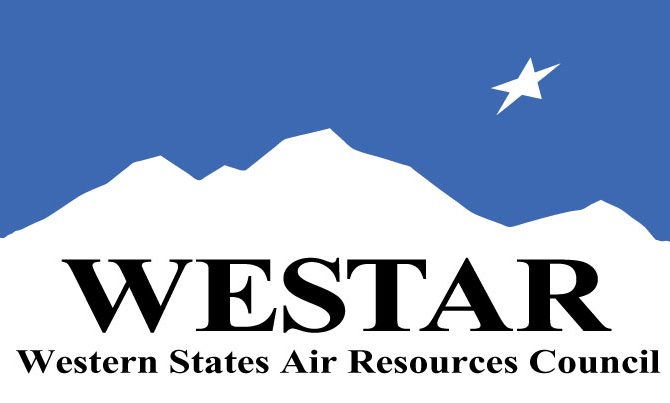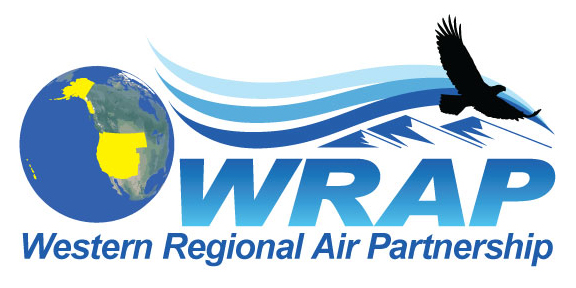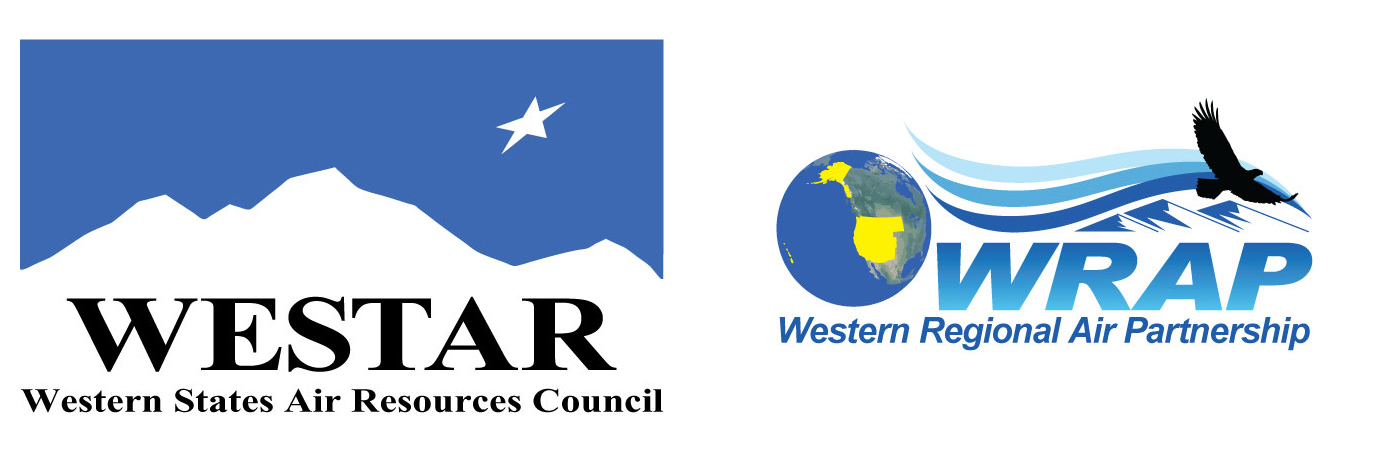Fire and Smoke Work Group
Smoke impacts from wildfires, prescribed fires, and agricultural burning are significant air pollution sources in the western United States. The fire season’s length, duration, intensity, and impacts of individual wildfires are increasing. The reasons for this include a warming climate, a build-up of wildland fuels after years of policies prioritizing total fire suppression, and an expansion of the wildland-urban interface. The trend toward increasing fire frequency and size will continue in the future. With a better understanding of the role of fire in maintaining healthy landscapes, public policy is evolving to balance the inevitability of fire with the need to protect human infrastructure and public health and welfare. In addition to non-burning methods for fuels management, this is done in part through the application of prescribed fire at various scales and frequencies, requiring land managers and air quality agencies to cooperate continuously. Agricultural fire applications also involve collaborative management by regulators and landowners for these short-term seasonal events.
Additionally, related to the historic build-up of wildland fuels, ongoing climate change causes altered weather patterns, shifts in the types and composition of natural landscape communities, and increased threats from biological pests on weakened and transitioning wildland ecosystems. Periodic and sustained drought and pressure to expand human communities into the wildland-urban interface heighten the importance of better understanding and tracking emissions and impacts from wildland fire activity, both for planned prescribed fire and unplanned wildfire in the western United States. In recognition of the increasing contributions of wildfire smoke, in frequency and duration, to ambient air quality health and welfare impacts, western states and tribes, and federal agencies, have formed cooperative tracking systems that are the technical basis for improved understanding of smoke from uncontrolled wildfires. These systems require ongoing resources and improvement to compile and maintain the necessary data and apply management methods to address these growing, complex, and significant problems for air quality and public lands. This regional interstate cooperation is intended to support the following:
- Coordinated inter-jurisdictional responses to near-field impacts and longer-range transport of wildfire smoke;
- Collaborative efforts through ongoing discussion of Smoke Management Plans, Programs, and Procedures by air quality and land management agencies to plan, execute, and track in detail – approved and accomplished fire activity within prescription to mitigate impacts of all types, and
- Application of mechanisms in the federal Clean Air Act and through the health and welfare protection authorities of individual states and tribes. Rules and regulatory programs are enacted using various options to manage fire activity and smoke impacts. These include the preparation of State, Tribal, or Federal Implementation Plans (SIPs/TIPs/FIPs) for Regional Haze and criteria pollutants, Exceptional Events demonstrations, high-resolution short- and longer-term fire emissions inventories for planning, as well as other methods.
The Fire and Smoke Work Group (FSWG) will focus on, address, organize work, and report on:
- Smoke Emissions and Modeling:
- Coordinating analysis and planning activities related to improving and tracking fire activity data to support and deliver emissions inventories for smoke emissions
- Review the treatment of fire and smoke emissions in modeling studies
- Smoke Management Planning and Coordination:
- Support planning work to assess the historic and range of future year air quality impacts from fire
- Identify and improve communication and collaboration for Smoke Management Programs
- Improve coordination between state, tribal, local, and federal agencies
- Establish a common framework to define frequently used terms and ideas to promote communication and understanding between state, tribal, local, and federal agencies
- Exceptional Events Support
- Track and facilitate information about Exceptional Events assessment efforts
The Co-Chairs will provide a summary report to the TSC at each TSC/WG Co-Chairs meeting, about the status of activities, findings, and work products for the topics described above. The Co-Chairs, with support from WESTAR-WRAP staff, will maintain an active open membership composed of interested state, tribal, local, and federal air agency and land manager experts, and publish the FSWG membership list and track participation. No formal detailed workplan for the WG or any subcommittees is required but welcome.
The FSWG will have regular virtual or in-person meetings on alternating months to manage activities and provide oversight to projects. Subcommittees to be defined by the FSWG will execute, track, and provide oversight for both in-kind and/or contractor-supported FSWG projects and will meet at self-defined separate intervals. The task-oriented topics and responsibilities for a Subcommittee will be a subset of the bulleted topics above from this Responsibilities and Deliverables section. The topics above will need additional clarification and definition in the process of defining Subcommittees’ scopes, assignments, and intended deliverables in writing. The Subcommittees will report regularly to the FSWG. The FSWG Co-Chairs will plan and direct the bimonthly calls and meetings, and with assistance from WESTAR-WRAP staff, take the lead in communications and other necessary TSC and Board interaction.
Exceptional Events Support Team
May 15, 2024 Fire and Smoke EE Teams meeting: Agenda | Attendance | Recording
March 20, 2024 Fire and Smoke EE Teams meeting: Agenda | Attendance | PM2.5 Exceedance Trends in the U.S. Presentation (Dr. Tong, George Mason University) | Recording
January 17, 2024 Fire and Smoke EE Teams meeting: Agenda | Attendance | Recording
November 15, 2023 Fire and Smoke EE Teams meeting: Agenda | Attendance | Recording
September 20, 2023 Fire and Smoke EE Teams meeting: Agenda | Attendance | 2024 EE Workshop Agenda | Recording
July 12, 2023 Fire and Smoke EE Teams meeting: Agenda | Attendance | NASA FireSense Presentation | Recording
May 17, 2023 Fire and Smoke EE Teams meeting: Agenda | Attendance | Recording
November 9, 2022 Fire and Smoke EE Teams meeting: Agenda | Attendance | Recording
July 20, 2022 Fire and Smoke EE Teams meeting: Agenda | Attendance | Screening and Weight-of-Evidence Methods for High-Ozone Events Associated with Wildfire Smoke Presentation | Recording
May 18, 2022 Fire and Smoke EE Teams meeting: Agenda | TOLNet: Wildfire Impacts Research, Tropospheric Composition Forecasting, and Satellite Validation Presentation | 2021 Western Wildfire Season Impacts on Air Quality Outline | 2021 Western Wildfire Season Impacts on Air Quality Presentation | Recording
November 17, 2021 Fire and Smoke EE Teams meeting: Agenda | Attendance | 2021 wildfire impact assessment Presentation | 2021 wildfire assessment data request memo | Recording
September 15, 2021 Fire and Smoke EE Teams meeting: Agenda | Attendance | Jaffe Presentation
July 8, 2021 Kickoff Meeting: Agenda and Notes | Smoke EE Resource List
WESTAR Prescribed Fire and Smoke Management Dialogue: Recommendations for the WESTAR Council (Spring 2019)
WESTAR Prescribed Fire and Smoke Management Dialogue: Summary of February 28 Meeting Themes (March 27, 2019)
WRAP FSWG 2017 Workplan Products
- Exceptional Event Data Resource List
- WRAP region map with Smoke Management Programs
- 2014 Actual, Representative Baseline and Future Fire Scenarios: Report | Summary Presentation
2024
July 15th Teams meeting: Agenda | Attendance | Recording
January 8th Teams meeting: Agenda | Attendance | Recording
2023
November 13th Teams meeting: Agenda | Attendance | Recording
August 28th Teams meeting: Agenda | Attendance | Recording | Smoke Communication Survey Results
June 12th Teams meeting: Agenda | Attendance | Smoke Communication Survey Results | WSMART Presentation – EPA
March 6th Teams meeting: Agenda | Attendance | Recording
February 6th Teams meeting: Agenda | Attendance | Fire and Smoke Collaborative Meeting Postmortem | Recording
2022
October 24th Teams meeting: Agenda | Notes & Attendance List | Recording
September 12th Teams meeting: Agenda | Notes | Attendance List | WRAP Smoke Exceptional Events Needs and Feedback Survey Results Summary
June 13th Teams meeting: Agenda | Laurie Hulse-Moyer WA SMP Presentation | Recording
April 18th Teams meeting: Agenda | 2021 Wildfire Impacts Presentation | Recording
February 28th Teams meeting: Agenda | Shawn Urbanski (USFS) Presentation
January 11th Teams meeting: Agenda | Anny Huang (CARB) Presentation | Recording
2021
November 1st Teams meeting: Agenda | Call Notes | SmokeEE Resource List Oct. 25, 2021 updated from: SmokeEE Resource List July 9, 2021 | Recording
July 26th Teams meeting: Agenda | Call Notes | Kris Ray Presentation | Future Fire Scenarios’ Emissions changes | Recording
June 28th Teams meeting: Agenda | Call Notes | ID Wildfire Smoke Interagency Coordination
May 24th Teams meeting: Agenda | Arizona Wildfire Smoke Forecast Program | Fire Data Warehouse Implementation | Manager-Planner Workshop agenda
April 19th Teams meeting: Agenda | Call Notes | CMFD project update | UT_Study
March 15th Teams meeting: Agenda | Call Notes
February 18th Teams meeting: Call Notes
2020
FSWG February 24th: Call Notes
FSWG January 14th: Call Notes
2019
FSWG September 18th: Call Notes
FSWG July 17th: Call Notes
RBFFS working group May 8th: Call Notes
RBFFS working group April 3rd: Call Notes
Joint FSWG and RBFFS working group March 19th: Call Notes
RBFFS working group March 6th: Call Notes
RBFFS working group February 22nd: Call Notes
FSWG January 28th: Call Notes
2018
FSWG December 13th: Call Notes
FSWG November 11th: Call Notes
FSWG October 29th: Call Notes
FSWG August 27th: Agenda/Notes | 2014 Fire EI data review tool | Base Year Fire EI white paper | Planning Baseline Fire EI white paper
FSWG June 7th: Call Notes
FSWG May 8th: Call Notes
-
Conceptual Model For Long-Term Fire Data Support project page
Under the WRAP Fire & Smoke Work Group workplan, the goal of this project is to establish technical standards and identify products and services needed for long-term availability of high-quality fire emissions data to support stakeholders with regard to air quality planning and management activities, nonattainment and maintenance areas’ designations, “exceptional event” identification, background level definition, and fire emissions reduction strategy evaluation. This has broad implications for regulatory air quality, as it will meet an existing need for what is the largest single pollution source category in the United States.
- Scope of Work (November 17, 2020)
- Call for Core Science Team members (January 21, 2021)
- CMFD Core Principles whitepaper (January 28, 2021)
- Core Science Team meeting #1 agenda (February 1, 2021)
- Core Science Team meeting #2 agenda (February 16, 2021)
- Core Science Team meeting #3 agenda (March 8, 2021)
- Core Science Team – Special Optional Meeting on Remote Sensing agenda (March 26, 2021)
- Core Science Team meeting #4 agenda (March 29, 2021)
- Core Science Team meeting #5 agenda (April 8, 2021)
- WFEDW Manager-Planner workshop (Oct. 21, 2021): Agenda | Recording

Contact Us
Western States Air Resources Council
(WESTAR)
1925 Aspen Dr.
Suite 600A
Santa Fe, NM 87505
Phone: (505) 954-1160
Fax: (505) 954-1216

